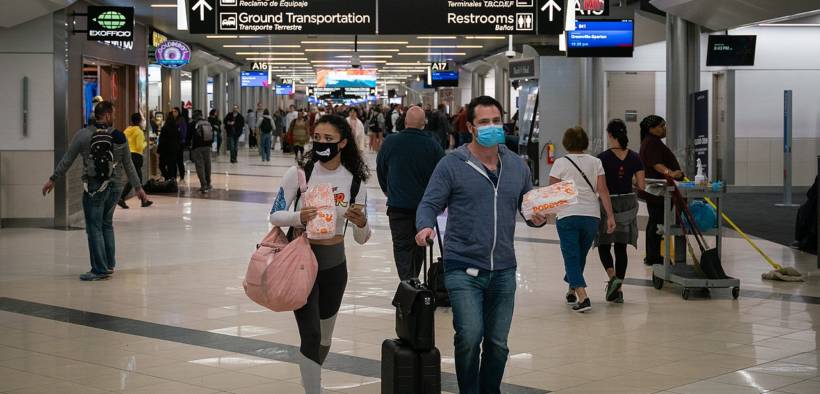House Passes Emergency Coronavirus Bill as Treasury Department Weighs Stimulus

The House of Representatives worked through Saturday to pass an emergency relief bill designed to provide increased Corvid-19 testing and paid sick leave for American workers. Although that sounds great in theory, beneath the fine print there are several caveats. A Senate version of the bill will be voted on this week and Treasury Secretary Steven Mnuchin hinted that it may take some time for the two chambers to reconcile the differences in the legislation. Mnuchin also said bailouts for several industries could be on the horizon.
Paid Sick Leave, but Not For Everyone
Digging into the House bill, Resolution 6201: Families First CoronaVirus Response Act, the surface-level details seem solid. Most critically, it provides for free Corvid-19 testing to live up to the bar set by Speaker Nancy Pelosi, D–Cali., “testing, testing, testing,” the New York Times reported.
While it may seem obvious, testing is a one of the most important actions a person can take, together with quarantine and cleanliness. The US, however, has failed to deliver on that front. The estimated number of tested individuals ranges from 10,000 to 14,000, according to BBC. It’s a stark contrast between South Korea, 210,000, and even the UK, 32,771.
The House bill allows insurance companies and federal programs to cover the cost of testing and will give a 6.2% increase to Medicaid. For Native Americans, $64 million is budgeted for testing amongst tribes; the Department of Veterans Affairs would get $60 million, and the National Disaster Medical System $1 billion to cover uninsured patients.
Aside from testing, the bill includes paid sick leave for American workers, but there are several catches, NYT discovered. Although the bill includes two weeks of paid sick leave with a possible three months of paid family and medical leave at 67% of their normal wages, businesses with over 500 employees are exempt from the law. Additionally, small businesses—companies with fewer than 50 employees—can apply for an exemption.
These two restrictions will significantly limit the effectiveness of the legislation. Roughly 20 million people will be unassisted by the emergency relief, NYT calculated. Twelve million workers are employed at small businesses and 6.5 million work at larger companies, but do not have paid sick leave as a benefit.
Workers who do fall within the bracket, including government employees, will have access to paid sick leave that includes carrying for a family member or staying home with children due to school closures.
Too Far or Not Enough?
The paid sick leave component sparked a partisan battle between Democrats who thought the bill did not reach enough workers and Republicans who thought it went too far. Initially, President Donald Trump said he would not support the legislation.
“Well, we just don’t think they’re giving enough. We don’t think the Democrats are giving enough,” Trump said as the two parties negotiated late into Friday night. “We’re negotiating. We thought we had something, but all of a sudden they didn’t agree to certain things that they agreed to. We could have something but we don’t think they’re giving enough. They’re not doing what’s right for the country.”
Eventually, Democrats caved to get a bill that might survive the Senate and earn Trump’s signature.
“Democrats preferred to have something rather than nothing. That was the choice we faced,” an anonymous congressional source told CNN. “Republicans didn’t support the mandate nor did they support leave for everyone. It was a clear nonstarter for them. Secretary Mnuchin and Republicans refused to consider any leave policies whatsoever without a cap.
Shortly before a vote was held, Trump tweeted his approval of it.
“This Bill will follow my direction for free CoronaVirus tests, and paid sick leave for our impacted American workers. I have directed the Secretary of the Treasury and the Secretary of Labor to issue regulations that will provide flexibility so that in no way will Small Businesses be hurt. I encourage all Republicans and Democrats to come together and VOTE YES!”
Incoming Stimulus?
Mnuchin went on Fox News for a Sunday morning interview and discussed the various avenues that will be available for businesses that feel they cannot afford to give paid sick leave. Smaller companies, he said, would have access to deposits they’ve made with the IRS and may even be able to take cash advances, he said.
In the longer-term, the secretary dropped the magic-S word: stimulus. He is already working with legislators to prepare an economic bailout for “airlines and other hard-hit businesses,” MarketWatch reported, in addition to a possible payroll-tax holiday for consumers.
The Congressional Budget Office did not have time to run a financial analysis to determine the cost of the House relief bill, but Mnuchin expects it within the next week.
“It is going to have costs that are significant, but not huge,” he said.
A Senate version of the bill must be passed first, and any differences between the two will need to be negotiated. Therefore, nothing is firm yet and it’s plausible that the Republican-controlled chamber could tone down the scope of the legislation. However, as it already has Trump and Mnuchin’s blessing, it could easily be fast-tracked to address the ongoing crisis.









